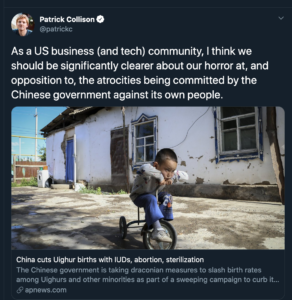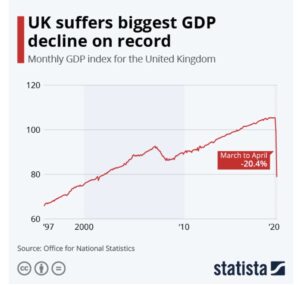“Now we are all sons of bitches”
75 years ago today, the nuclear age began. July 16 1945 was the day the first atomic bomb was detonated in the New Mexico desert in the Trinity test. To mark the anniversary the Bulletin of the Atomic Scientists has compiled a memorable assembly of personal reflections by the scientists who worked on the bomb and who were there when it went off. It’s an unmissable, moving read. Here are two of the reflections.
Val Fitch:
It took about 30 millionths of a second for the flash of light from the explosion to reach us outside the bunker at south 10,000. It took the blast wave about 30 seconds. There was the initial loud report, the sharp gust of wind, and then the long period of reverberation as the sound waves echoed off the nearby mountains and came back to us.
I got up from the ground and watched the now famous mushroom cloud rise in the morning sky. Apparently no one had told the military policeman, stationed at the door of the bunker to control access, what to expect. He was absolutely pale and a look of incredible alarm was on his face as he came away from the bunker door to stand beside me and view the sight. I simply said what was on my mind, “The war will soon be over.”
Kenneth Bainbridge:
After the blast wave had passed, I got up from the ground to congratulate Oppenheimer and others on the success of the implosion method. I finished by saying to Robert, “Now we are all sons of bitches.” Years later he recalled my words and wrote me, “We do not have to explain them to anyone.” I think that I will always respect his statement, although there have been some imaginative people who somehow can’t or won’t put the statement in context and get the whole interpretation. Oppenheimer told my younger daughter in 1966 that it was the best thing anyone said after the test.
Ancient history? Yes. But if China, fresh from subjugating Hong Kong, were to move on Taiwan…
The costs of the next Cold War: $3.5 trillion
And while we’re on the subject of China, this from yesterday’s FT:
A larger tech cold war is taking place that could cost $3.5tn over the next five years, according to a report today by Apjit Walia, Deutsche Bank’s Global Head of Tech Strategy. This permeates to the consumer level, with DB surveys recording 41 per cent of Americans and 35 per cent of Chinese saying they will not buy each other’s products.
The $3.5tn figure comes from a $400bn reduction a year in domestic end demand from China and $100bn a year as a “Tech Wall” creates extra costs for companies dealing with rival internet platforms, operating systems, and communications and payment networks. A further $1tn in costs would come from rebuilding and reconfiguring the supply chain, mainly falling on “final goods manufacturers” who currently use China as a manufacturing base.
If there is any upside, it might come from similar dynamics to the US-USSR cold war, where a ramp in spending on defence and the space race could translate as a leap in tech investment this century. US government spending alone on R&D more than doubled as a percentage of GDP between 1957 and 1964 — to 2.2 per cent. Tech investment might not match that in this post-Covid era, but it could still provide a much needed blast of warmth for the sector in icy times.
Boris Johnson needs a therapist. Who knew?
John Crace on Boris Johnson’s latest shambles in PMQs:
At this point, it dawned on Starmer that Boris almost certainly hadn’t read the report [from the Academy of Medical Sciences on the dangers of an Autumn surge in Covid cases] to which he had referred – a little slow on the uptake from the Labour leader as the prime minister never reads any reports of more than two paragraphs – so he asked him outright if he had. “Um … er …,” Boris hesitated. He was aware of the report. In the same way he is aware that he has children, but is unable to say exactly how many. And in the same way as I am aware of the space-time continuum but would be unable to explain exactly what the science meant to anyone. Though if it turned out that Boris only really existed in another parallel dimension then I’d happily settle for that.
Apple, Ireland and the saga of €13 billion
This is stuff you couldn’t make up.
Four years ago, the European Commission said that Ireland had failed to collect €13 billion in taxes from Apple. According to the Commission this meant that Apple had received illegal state aid and should have paid more taxes. Apple duly handed over the €13B to the Irish government, which put it in an escrow account (where it’s been sitting ever since earning interest). Apple appealed the ruling to the EU General Court. Even more intriguingly, so did the Irish government.
Today, the Court handed down its judgment — that the European Commission’s case had no legal basis. So unless the Commission appeals, then the Irish government — which will be strapped for cash because of Covid-19 and the forthcoming financial crash caused by the UK crashing out of the EU without a deal — will cheerfully refund Apple.
According to the FT the EU has two months and 10 days to appeal against the decision, and it believes that the commission is likely to file an appeal and the case will be heard by the European Court of Justice, the EU’s highest court, which will issue a final ruling.
All of this may make sense to lawyers. But Sinn Féin, the main opposition party in the Irish parliament is not amused. Nor, I suspect, are many of my fellow-countrymen and women.
This blog is also available as a daily email. If you think this might suit you better, why not subscribe? One email a day, delivered to your inbox at 7am UK time. It’s free, and there’s a one-click unsubscribe if you decide that your inbox is full enough already!











